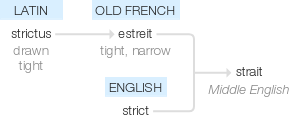Strait
Middle English: shortening of Old French estreit ‘tight, narrow’, from Latin strictus ‘drawn tight’ (see strict).
wiktionary
From Middle English streit, from Old French estreit (modern form étroit), from Latin strictus, perfect passive participle of stringō(“compress, tighten”). Doublet of stretto and strict.
etymonline
strait (n.)
mid-14c., "narrow, confined space or place," specifically of bodies of water from late 14c., from Old French estreit, estrait "narrow part, pass, defile, narrow passage of water," noun use of adjective (see strait (adj.)). Sense of "difficulty, plight" (usually straits) first recorded 1540s. Strait and narrow "conventional or wisely limited way of life" is recorded from mid-14c. (compare straight (adj.2)).
strait (adj.)
"narrow, strict" (late 13c.), from Old French estreit, estrait "tight, close-fitting, constricted, narrow" (Modern French étroit), from Latin strictus, past participle of stringere (2) "bind or draw tight" (see strain (v.)). More or less confused with unrelated straight (adj.). Related: Straightly.
